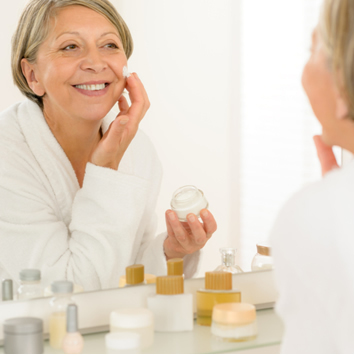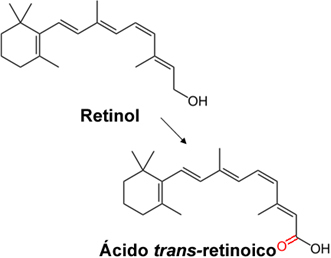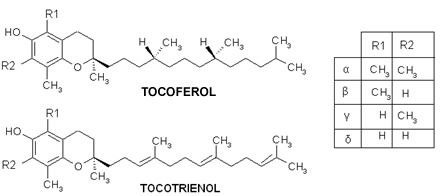Vitamins are components that are very present in products for cosmetic purposes. Those with the greatest commercial interest are vitamins A, E, C, D, B3, panthenol (provitamin B5) and B6. Among them, the most used in cosmetics and which we will talk about in more detail below are vitamins A and E:
- Vitamin A:
The pure form of vitamin A is the retinol, belonging to the class of retinoids, which are compounds used in cosmetology mainly because they have a antioxidant power. They are mainly incorporated in creams and body oils.
Research indicates that vitamin A helps skin regeneration, fighting the common signs of aging. Over time, the skin loses collagen and its ability to maintain its natural flexibility, elasticity and firmness. But retinol helps the skin retain water and heal, so it looks better. Also, the fact that it favors skin cell regeneration is good because it makes the sensitive skin of older people less susceptible to damage.

Retinol also binds to free radicals that have a harmful effect on cells and are believed to cause arteriosclerosis, cataracts, tumors, skin diseases and rheumatic diseases.
Vitamin A also penetrates the skin and normalizes the keratinization process, leaving the skin smooth and soft, reduces epidermal thickening, normalizes dry skin and reduces leather scaling hairy.
Some authors say that the mechanism of action of retinol may be linked to a product of its metabolism, the acid trans-retinoic. This acid binds to receptors in the cell nucleus and interacts with certain DNA sequences, regulating the production of certain proteins and enzymes, reducing the signs of aging in the skin. It also undergoes oxidation before the essential structures for homeostasis, hence its antioxidant action.

Since this vitamin present in our skin can be destroyed through exposure to sunlight, it is also included in sunscreens for skin and hair.
As in all cases, the effect of vitamin A depends on the dose administered. THE Anvisa regulates that the use of retinoids in cosmetic products should be guided by the following determination: in the case of Vitamin A, in its forms Retinol and Retinyl Palmitate (a form of vitamin A that has greater chemical stability), should be used at a maximum concentration of 10,000 IU of vitamin A/g, in its Retinaldehyde form, the maximum concentration is 0.05%, subject to proof of its chemical stability in the product finished.
- Vitamin E:
Vitamin E is actually made up of eight different molecules, between four tocopherols and four tocotrienols, as shown below, where the structures α, β, γ or δ are determined according to the position of the methyl group (CH3).

It acts as a lubricant, moisturizer and skin regenerator that has suffered the action of time, the sun, pollution and oxidative stress, mainly by protecting membranes against lipoperoxidation. As it is a collagen stimulant, it also increases the skin's firmness and elasticity.
Thus, vitamin E is widely used in oral supplements and topical products to prevent disease or photoaging. After topical application, it is easily absorbed through the skin. Vitamin E is a highly desirable ingredient in formulations to rejuvenate and protect skin tissue because it has antioxidant capacity. in vivo.
Vitamin E is widely used in after-sun products because it reduces damage induced by UV rays, decreases erythema and skin sensitivity after exposure to UV light.

In addition, it is also present in baby rash creams, aftershaves and hand and foot moisturizers due to its anti-inflammatory, calming and healing properties.
By Jenninfer Fogaça
Graduated in Chemistry
Source: Brazil School - https://brasilescola.uol.com.br/quimica/vitaminas-usadas-cosmeticos.htm
